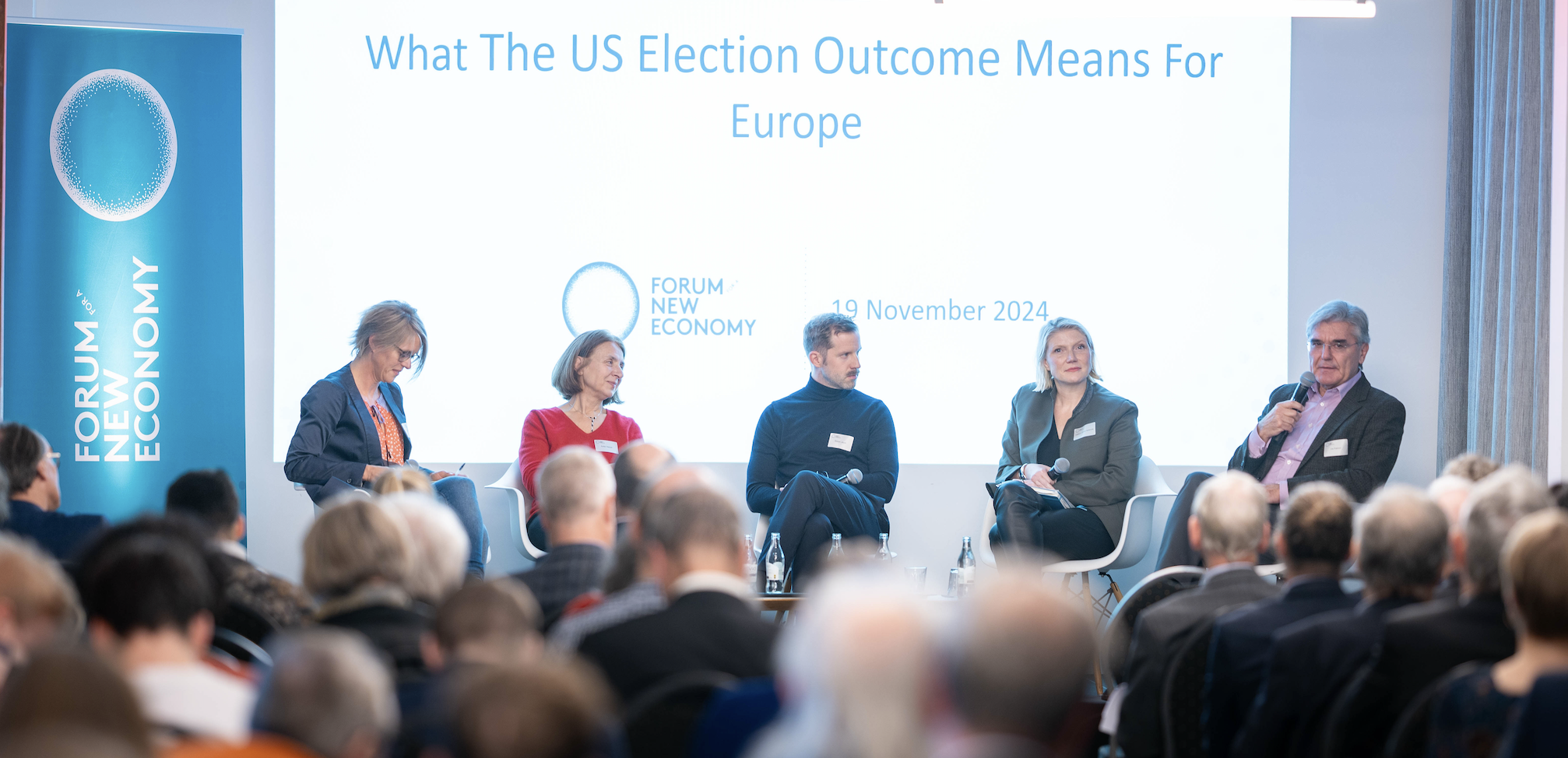NEW PARADIGM
Re-live: What The US Election Outcome Means For Europe
Joe Kaeser, Cathryn Clüver Ashbrook, Simon Jäger and Anke Hassel discussed how Europe and Germany should prepare for the coming Trump administration.
BY
FORUM NEW ECONOMYPUBLISHED
22. NOVEMBER 2024
Trump’s tariff policies are set to have significant adverse effects on the German and European economies. Thomas Theobald (IMK) outlined two possible scenarios. A 60% tariff on US imports from China and a 10% tariff on all other US imports would result in a decline in real GDP for Germany and Europe by around 0,7%. If the US imposes even higher tariffs (15% on all other US imports) and this policy is met with retaliatory tariffs from China, real GDP is expected to drop by around 1% in Europe and Germany. Even though the model assumes a relatively high elasticity of import substitution, the overall harmful effects dominate, resulting in reduced GDP growth, increased costs of imports, higher inflation, and decreased trade volumes. He highlighted that US trading partners in North and South America will experience even greater economic losses and that, as is common in times of high inflation, the poorest households will bear the brunt of the economic hardship. Theobald underscored that the projected US trade policy will hit Germany hard and call into question its export-led economic model.
Following this forecast on the economic challenges, the panel discussed the political lessons for the continent resulting from the US election. It was emphasized that the tariffs threatened by Trump run counter to American interests and will put a lasting strain on the transatlantic relationship. In the face of intensified systemic competition, Europe must strengthen its ability to act.
Stocktaking: Europe after the US elections
Joe Kaeser reported on his impression of a socially divided country. According to the Siemens Supervisory Board Chairman, Europe must prepare itself for an irreversible break in transatlantic relations. The focus of the USA is turning towards Asia, while the Global South, above all China, together with Brazil, South Africa and India, is in the process of defining a new world order. According to Kaeser, Europe can only counter these developments by uniting to safeguard its economic and security policy interests, possibly within the framework of the new model of concentric circles as ‘Europe 2.0’ with economically strong countries such as Germany and France as the driving force.
“Europe must do more than just be shocked. (…) We are not prepared for a cooling of transatlantic relations.” – Joe Kaeser
Cathryn Clüver Ashbrook pointed out that if the Trump administration implements the foreign policy plans in the Heritage Foundation’s ‘Project 2025’ strategy, the US could try to play European countries off against each other. The US expert from the Bertelsmann Foundation advised the EU to present a united front to China and the US. Germany would make itself increasingly vulnerable if it did not think more closely about the economy and security. She referred to approaches on how this could be done in practice at national level, for example with a ministry for economic security as in Japan. A clearer geo-economic strategy was also needed to emphasise the value of the EU to voters. Instead of the current disorientated Europe, which is primarily guided by external constraints, a common European vision is needed.
What lessons for policymaking? (‘Is it the economy, stupid’ ?)
For Anke Hassel, Europe’s increasing dependence on the USA and China for technological development is a cause for concern. In order to strengthen its ability to act, the European Union should expand the commercialisation of cutting-edge research, deepen the internal market, promote diversification and increase the common budget.
Simon Jäger also emphasised the need for increased spending at European level to support Ukraine. The US election had revealed a ‘realignment’. With their economic populism, the Republicans had succeeded in turning influential trade unions such as the ‘teamsters’ away from the Democrats. Cathryn Clüver Ashbrook argued that these new voter coalitions may only be a temporary phenomenon, as Trump’s practical policies will worsen the economic situation of most workers and weaken the trade unions.
The paradox of Trump voters voting against their own interests can be applied to the EU and Germany, says Anke Hassel. In view of the geo-economic situation, more European solutions are needed, such as those outlined in the Draghi and Letta reports. However, the economist emphasised that increased European integration would become increasingly unpopular with growing support for right-wing populists and, as in the example of Brexit, could even be accompanied by an even greater boost for populists. It is therefore essential to address people’s economic insecurity. Many employees have suffered from real wage losses in recent years and have therefore increasingly voted for the AfD.
Economic policy could counter populism by promoting inclusive growth that allows people to share in the country’s prosperity, explained labour market economist Simon Jäger using the example of a concept in which bureaucratic hurdles are removed with the aim of recruiting skilled workers for those companies that are unionised or have a works council. But eventually, as Joe Kaeser puts it, a better economic narrative will be needed to win people back.

